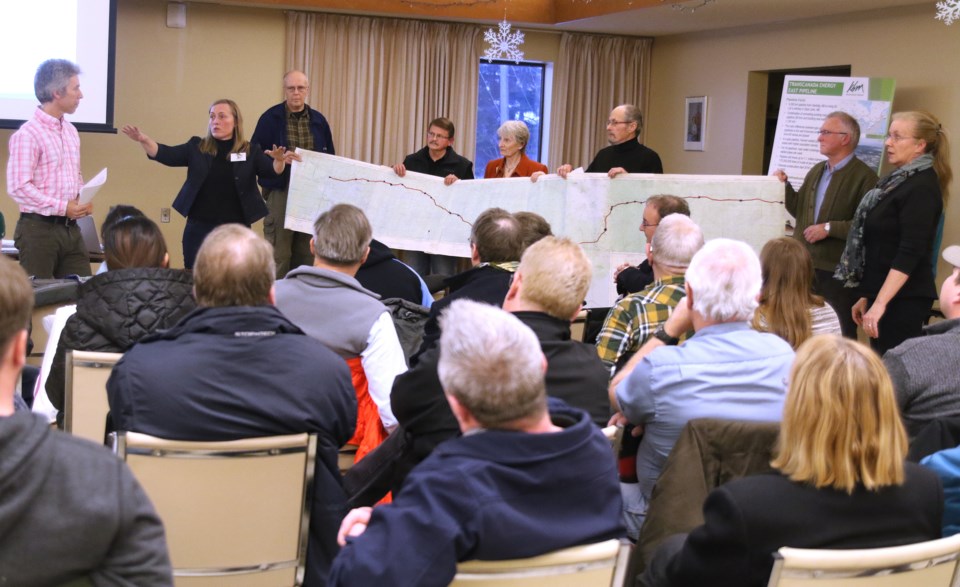THUNDER BAY – A consultation over converting a natural gas pipeline to carry crude oil through the region collapsed within 15 minutes on Thursday evening.
Protesters who opposed the Energy East Pipeline in principle disrupted the Common Voice Northwest consultation regarding what constitutes a “significant water crossing.”
The group took the stage and began making its own presentation shortly after the KBM Resources Group consultants explained their vision for the consultation.
The crowd of over 70 people split into two meetings in the small Oliver Road Community Centre hall after consultants were unsuccessful in urging those conducting the alternative presentation to cede the floor.
Citizens United for a Sustainable Planet member Paul Berger led the protest. He called converting the 4,500-kilometre pipeline between the Alberta oil sands and the Atlantic Ocean “a disaster waiting to happen,” insisting leaks in river systems leading into Lake Superior would impact Thunder Bay’s standard of living and economy from drinking water to outdoor recreation.
“We think it’s a huge risk for the natural environment here and a disaster for climate change,” Berger said.
“The expansion of the oil sands this pipeline would enable is a climate killer. This is the post-Paris agreement days where we’ve committed to cutting our carbon emissions and this goes in the exact opposite direction. “
Council of Canadians local chairwoman Ruth Cook argued the consultation was too narrow. Where Common Voice Northwest sought to consult over waterways, Cook considers the issue to include Canada’s political commitment to limiting climate change and its economic commitment to shifting its energy mix away from fossil fuels.
“This inquiry has taken this question that is this wide and they’ve brought it down to here saying, ‘let’s define significant waterways, ones we have to protect in case there’s a spill,’” she said.
“Once you’ve decided to answer that question, the scope gest narrower and narrower and there’s no place to go except straight to approving a pipeline.”
Graham Saunders teaches the Water Resource Management course at Lakehead University. He stressed the significance of all points where the pipeline is even near water.
“I think virtually all the waterways we’re talking about crossing are significant because if something goes wrong, the dilbit can go into streams and downstream through the basin,” he said.
“The terms of reference are ‘water crossings’ but there’s no mention of ‘water parallel to.’ So if we have a pipeline going next to a lake for a kilometre or two or three or whatever it is, it’s also significant.”
Those kinds of concerns drove Tanice Marcella to become the chairwoman of Common Voice Northwest’s Energy East Task Force.
Marcella had questions about the pipeline’s age as well as the risk of oil transfer through pipelines and over rail but nothing concerned her so much as the oft-repeated term, “significant water crossing” that appears in TransCanada Pipelines’ application for conversion.
She said Common Voice Northwest was among the only organizations in the region with intervenor status and hence, among the only voices the pipeline conversion process would hear out.
“In TransCanada pipelines’ application for the pipeline, the term ‘significant water crossing’ was very vague. We need that to be defined,” she said.
“I don’t know why more groups didn’t apply for intervenor status. I’m a concerned citizen so I became involved and I wanted to be involved with someone who was proactive. “
Although many vocal attendees opposed the pipeline unequivocally, others stood up as the project’s supporters. David Boileau pointed out a number of Northwestern Ontario’s workers went west over the last decade and have made good living from the oil sands.
Boileau was unmoved by dissident arguments that decreasing the oil supply will trigger sufficient innovation in alternative energy as he insisted oil transporation by rail still constitutes a greater threat to environmental safety than would a converted Energy East Pipeline.
“Right now, oil is going across all these rivers in a very uncontrolled situation in terms of rail car traffic so we have a lot more risk in the next 20 years of rail cars going into the Nipigon River than we do having an oil spill by pipeline.”
